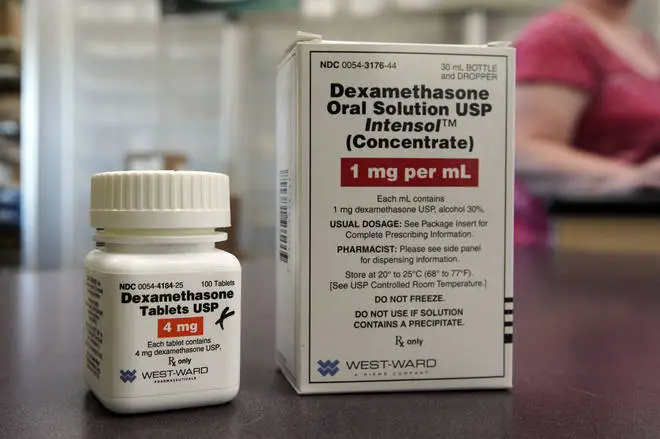
Richard Spurr 1am - 4am
17 June 2020, 11:13

What is Dexamethasone?
Dexamethasone has been hailed as "the first medicine to reduce death in any group in relation to Covid-19."
The steroid, labelled the "biggest breakthrough yet" in fighting coronavirus, was approved for NHS use on Tuesday.
Here, we take a look at more details about the drug, the trial, and a patient tells what it was like being put on the drug while he battled Covid-19.

Peter Horby on life saving Dexamethasone
Dexamethasone is an anti-inflammatory steroid, used widely to treat arthritis and asthma.
A study of dexamethasone, co-ordinated by Oxford University, suggests it is the first drug to reduce deaths from coronavirus.
It has been described as the most important trial result for Covid-19 so far.
A course of the drugs involves a six milligram dose, once a day, which can either be given by mouth or by injection.
It is a relatively cheap drug, costing around £5 for a complete course of treatment in the NHS.

Researchers found that the drug reduced deaths by up to a third among patients on ventilators, and by a fifth for those on oxygen.
It has been immediately approved to treat all UK Covid-19 patients admitted to hospital and requiring oxygen, including those on ventilators.
Scientists estimate that if they had known what they now know about dexamethasone at the start of the pandemic, 4,000 to 5,000 lives could have been saved in the UK.
They added that, based on their results, one death would be prevented by treatment of around eight patients on ventilators, or around 25 patients requiring oxygen alone.
England's chief medical officer Professor Chris Whitty said it was "the most important trial result for Covid-19 so far", and "will save lives around the world".
This is the most important trial result for COVID-19 so far. Significiant reduction in mortality in those requiring oxygen or ventilation from a widely available, safe and well known drug. Many thanks to those who took part and made it happen. It will save lives around the world. https://t.co/zRIaHulHOe
— Professor Chris Whitty (@CMO_England) June 16, 2020
Peter Horby, professor of emerging infectious diseases in the Nuffield Department of Medicine, University of Oxford - and one of the chief investigators for the trial, described it as "an extremely welcome result".
More than 11,500 patients from 175 NHS hospitals have been enrolled on to the Recovery trial since it was set up in March to test a range of potential coronavirus treatments.
In the dexamethasone study, 2,104 patients received 6mg of dexamethasone once a day via either mouth or intravenous injection for 10 days.
Their outcomes were compared with a control group of 4,321 patients.
Over a 28-day period, the mortality rate among those requiring ventilation was 41% and 25% among those needing oxygen.
The mortality rate among those not requiring respiratory intervention was 13%.

Dr Chris Smith explains what Dexamethasone is and how it's used
Pete Herring, who was given dexamethasone as part of a trial at Addenbrooke's Hospital in Cambridge, said the steroid drug "definitely" helped to save his life.
The 69-year-old, from Little Downham, near Ely, was admitted to hospital on April 28.
He said he was given the drug in tablet form from early in his stay, adding that he believes it was a daily dose, and that he was well enough to be discharged on May 6.
It took a further fortnight of recovery at home before he felt "back to normal".
"I was struggling for breath really and I was on oxygen (when admitted to hospital)," he said.
"They said would I like to do a trial?
"They didn't say what drug and it could have been one of three or four because they were trying different ones, which I agreed to.
"Obviously he gave me the right one.There was no magic switch, it was a gradual coming back really. It wasn't anything overnight."
Mr Herring said doctors were close to putting him on a ventilator but they found that giving him oxygen through a face mask worked.
"They said 'Well, we will have to put you on a ventilator but we will just try this mask and see if that works', which it did, thank goodness," he said.
"I wouldn't have enjoyed going on a ventilator."
Asked if he believed dexamethasone helped save his life, he said: "Definitely. I'm here to tell the story and I'm really thankful to the NHS for that. It's really, really good.
"I had no qualms about doing a trial because my way of thinking is it would hopefully help other people if they do find that it works, and it's worked and that's really brilliant."
Mr Herring said that on the day he came out of hospital he was "feeling better" but "obviously not right as it took a fortnight then to get back to normal".